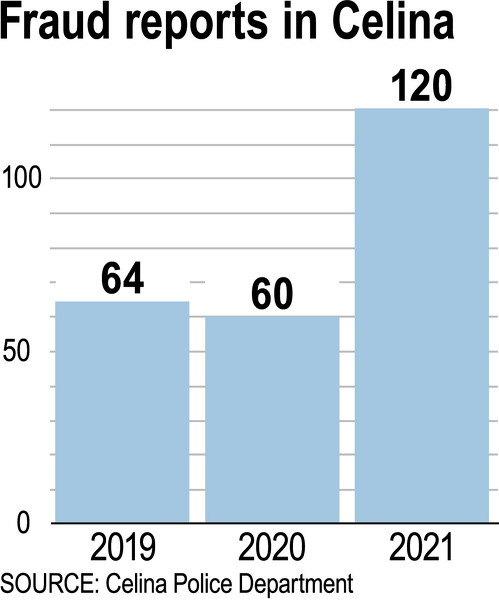Friday, February 25th, 2022
All types of scams on rise
Reports of fraud doubled in 2021
By William Kincaid

Photo by Daily Standard Staff
Fraud reports in Celina by year.
CELINA - Some Celina residents have exhausted their savings and/or cracked open their nest eggs in pursuit of romance, extraordinary prizes or other outcomes that wind up being scams, many of which originate from overseas.
Celina Police Chief Tom Wale said in 2021, local victims were swindled out of roughly $500,000. That figure was calculated based on police reports totaling $300,000 plus one account involving a loss of $200,000 where the victim declined to file a report.
"It could be much higher and I suspect it is much higher than that," he said. "I think most of the people don't report they're victims because they're embarrassed or ashamed," Wale said Thursday while urging the public to protect themselves and sensitive data.
Scams reported in Celina come in many forms and shapes but are typically executed over the internet or phone, Wale said. They're also on the rise and expected to continue to escalate in the coming years with the ubiquity of online transactions and communications, Celina police detectives Stephen Yoder and Brian Taylor said.
People can be exposed to scams just like COVID-19, Wale said.
"Everybody knows somebody who's been a victim of this," he noted.
Some may think they've fallen in love with a person who needs their financial help.
"A lot of times when (scammers) get their hooks into them, they keep coming back," Wale said. "When they get in so deep that they realize they've gone too far, even after speaking to us two and three times sometimes, they will continue feeding the scam because they're just hoping it works out for them, that we're wrong."
Waled cited a case of a middle age bachelor who was successful, had a home fully paid off and was in possession of substantial savings. The man made contact on social media with a person he thought was a military servicewoman deployed overseas, thanking the person for her service.
That led to a series of online correspondences in which the man thought he was in love, Wale said.
"He went through all his savings and mortgaged his home and he lost over ($100,000)," Wale said.
People who send nude pictures to someone they've never met in person can fall prey to extortionists who in turn threaten to disseminate the compromising images to the victim's friends and family, unless they receive payment.
There's also a laundering scam where people may be lured into becoming a money mule, in effect receiving and then forwarding on cash or merchandise to another address or account. The victims unwittingly face criminal charges for their part in the scheme.
"Sometimes these people that do get in trouble are not the masterminds behind all this stuff," Yoder said.
Others are duped into believing they've won a new car or cash prize. The only catch is they're asked to pay transfer fees or taxes on their winnings, he said.
"Whenever they want money from you first to give you something you supposedly won, it's a scam," Wale said. "Invariably, if you fall for it, they will come back and say, 'Yeah, we ran into a snag, we need more money. They will continue until a person quits giving them money whether because they ran out of money or because they caught on."
Such schemes fall under the category of fraud, Wale said. The number of fraud reports swelled from 60 in 2020 to 120 in 2021, Wale said.
Because many incidents of fraud emanate from places like Nigeria and Russia, detectives often are stymied in following through on the cases. Chances of victims receiving restitution also are unlikely.
"We have a very difficult time on the local level doing a good investigation. We basically take reports and give them advice on what to do," Wale said.
The Federal Bureau of Investigation usually doesn't get involved unless the fraud results in losses of $250,000 or more, he added.
Still, Wale urges scam victims to reach out to police. If they opt not to file a formal report, they can still relay the nature of the scam so police officers can be aware of what's going on in the area.
"If they are a victim, even though the chances of us making a recovery for them is almost nil, if they don't report it then we're definitely not going to solve it," Wale said.
Scams are not unique to Celina.
The FBI Internet Crime Compliant Center in its 2020 report listed a record number of 791,790 complaints, with reported losses exceeding $4.1 billion, a 69% increase from the prior year.
Ohio ranked No. 12 in the nation in 2020 with 13,421 reported internet crime victims, the report shows. Ohio also came in at No. 5 for the most of amount of victim losses at $170 million, per the report.
"In 2020, while the American public was focused on protecting our families from a global pandemic and helping others in need, cyber criminals took advantage of an opportunity to profit from our dependence on technology to go on an Internet crime spree," wrote FBI Deputy Director Paul Abbate in the report.
The criminals used phishing, spoofing, extortion and various types of Internet-enabled fraud to target the most vulnerable, Abbate wrote, including medical workers searching for personal protective equipment, families looking for information about stimulus checks to help pay bills and many others.

